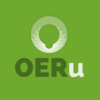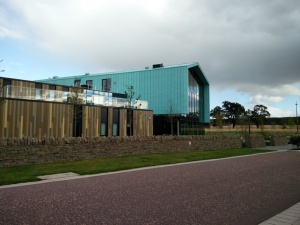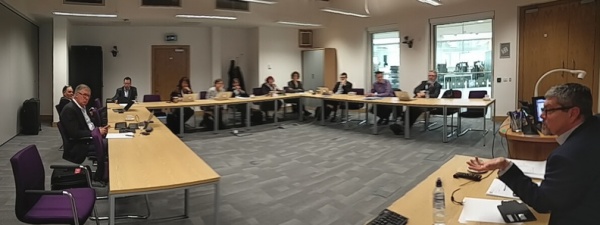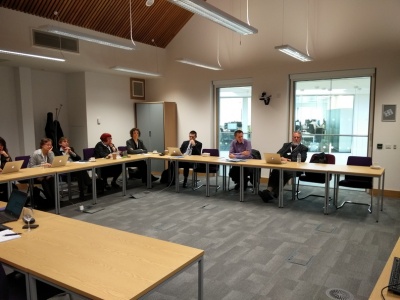OERu 16.10 Council of Chief Executive Officers meeting report
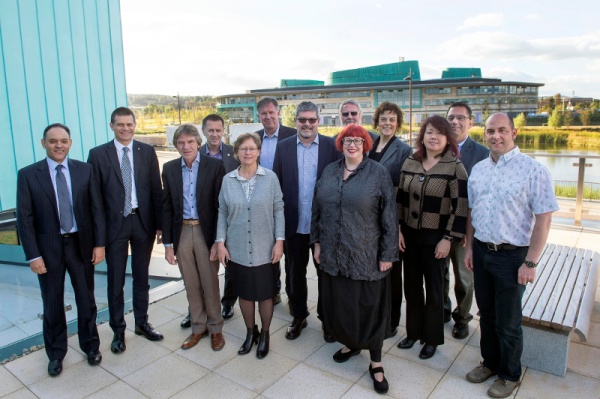
| “ | ""#oeru16 Council of CEOs confirms launch of #OER 1st year of study leading to two exit awards" | ” |
| —@Mackiwg | ||
The meeting reviewed the decision proposals arising from the 5th International Meeting of OERu Partners and considered issues tabled for discussion. The key foci of the meeting were to plan the implementation of the OERu 1st year of study and to clarify what success looks like for partner institutions represented at the CEOs meeting. The participants deliberated on the longer-term goals for the OERu partnership.
About the OERu Council of CEOs
The OERu Council of CEOs is an assembly of senior leaders from OERu partners called together for consultation on strategic higher education futures and open education approaches. The Council provides executive leadership at the corporate institutional level to facilitate the achievement of the aims of the OERu for the mutual benefit of member institutions and learners. The Council comprises incumbent Chief Executives (or senior designated nominees) of current OERu partner organisations.
Contents
Summary of key decisions
The summary of key decisions should be read in conjunction with the full meeting report and corresponding links to the action items.- Confirmed the decisions to launch the OERu 1st year of study as a minimum viable product (MVP) and as a pilot, leading to two exit qualifications, targeting 15 March 2017 as the launch date with the aim of achieving 100 learners requesting assessment for formal credit.
- Approved the decision proposals tabled by the 5th International Meeting of OERu Partners.
- Advised that the recruitment of new partners should give priority to improving the global balance of partners from different geographical regions.
- Acknowledged that lack of funding and capacity will constrain marketing and recruitment efforts for the pilot. The project will therefore proceed as a "soft-launch", pursuing realistic but conservative targets as the OERu model builds brand awareness and collects data from the process evaluation to inform future decision-making.
- Discussed what OERu success looks like for partner institutions, endorsing the setting of realistic achievable goals, informed by strong alignment between aspirations and partner expectations.
- Confirmed that OERu should progress the implementation of an undergraduate degree to be developed in phases with associated exit awards for the 2nd and 3rd years of undergraduate study respectively.
- Agreed to develop the Learning in a Digital Age (LiDA) course as an open boundary course pilot with opportunities for two or more partners to offer LiDA on campus in parallel with the open OERu version.
- Recognised the value of open research of the OERu project, with the implementation of the process evaluation to be afforded immediate priority.
- Directed the OERF to compile a risk register of the OERu collaboration for review.
Confirming the agenda
The following agenda was confirmed by attendees:
- Welcome and introductions
- Aims of the meeting
- Review of the Terms of Reference and office bearers.
- Decision proposals
- Launch the OERu MVP 1st year of study - 15 March 2017 including:
- Due diligence steps
- Course outline templates for academic course review and bilateral credit transfer and articulation agreements for nominated MVP exit awards
- Establish and implement the OERu Ambassadors initiative based on guidelines proposed during the partners' meeting
- Progress the implementation of the staff development proposals
- Renew the call for partner representation on the OERu technology working group.
- Reconfigure the proposal for OERu Academic Board into a Programme Advisory Group based on notes from the partners' meeting.
- Progress the implementation of Academic Volunteers International and related student support recommendations.
- Initiate consultation on the OERu Strategic Plan 2018 - 2020 (drawing on the strategic goal recommendations from the meeting) to be tabled at the 6th International Meeting of OERu partners.
- Technology roadmap:
- Implement SSO as a priority
- Progress Open Badge Backpack ("blockchain-ready") as a shared service for OERu partners
- Consider authoring and course site publishing alternatives drawing on the MVP experience
- Create an open, safe place for partner representatives to express technology needs and to get feedback on open source tool options.
- Launch the OERu MVP 1st year of study - 15 March 2017 including:
- Issues tabled for CEOs meeting
- Partner recruitment
- Improve geographical representation - how can existing partners assist?
- Validate and communicate costs, benefits and advantages
- Learner recruitment
- MarComs guidelines for partners
- Articulate what OERu success looks like for partners represented at the CEO's meeting
- Clarify the longer term goal (Full degree? Other?)
- Accelerate limited scope pilots by a small group of partners (e.g. an open boundary course pilot (LiDa), Other?)
- Delineate partner costs / budget implications, and consider crowd funding for shared projects?
- Prioritise research and evaluation
- Consider the balance between work on OERu architecture and work on OERu courses
- Develop a risk register for review.
- Partner recruitment
The terms of reference and office bearers of the Council remain unchanged.
Report on decision proposals
- Opening discussion on the optimal size of the OERu as a network of "like-minded" institutions
- Recommended that a network of between 50 to 70 institutions would be optimal for fiscally sustainable OER Foundation (OERF) operations, without the need to introduce new organisational tiers to manage a larger network (N.B. current membership of 31 contributing partners).
- Stressed the importance of improving the global balance of partners from different geographical regions.
- Recommended that recruitment efforts should focus on Sub-Saharan Africa, with existing partners assisting the OERF in identifying leads for recruitment from the region where appropriate.
- Acknowledged that growth in the number of partners from existing regions would contribute to the fiscal sustainability and capacity of the network, noting that new partners from these regions will be well received.
- Confirmed the value of hosting regional partner meetings to support and respond to regional differences in the network.
- Emphasised that the network's first priority is to implement the 1st year of study and recruit learners, noting that a successful implementation would most likely support future partner recruitment.
- Launch of the OERu MVP 1st year of study - 15 March 2017
- Reviewed the feasibility of the proposed launch date:
- Confirmed that the OERu will have sufficient open online courses completed for the launch of the 1st year of study, given the current state of course development as of October 2016.
- Noted that completing the process requirements for bilateral articulation agreements for transcript credit between assessing institution and receiving institution is a critical path requirement. The partners' meeting concluded that these processes are achievable within the time frames. Thompson Rivers University reported that they have extensive experience and systems for managing credit transfer processes.
- Discussed processes for maintaining accurate institutional information on the OERu.org website for course listings, credit options, and prices for assessment services where applicable. The OERF confirmed that partner institutions each havea designated representative with password access to edit information on the OERu.org website, but reported that some institutions have not been diligent in keeping their institutional information up to date. The meeting confirmed that the OERF has a mandate to remove course listings and / or information from the OERu.org site, which is clearly outdated or incorrect (with prior notification to the respective partner institution).
- Agreed that the inaugural offering of the OERu 1st year of study will be launched as a pilot project.
- Established a KPI target of 100 learners taking assessment for formal credit during the pilot offering.
- Endorsed the decision proposal to launch the OERu 1st year of study targeting a start date of 15 March 2017.
- Reviewed the feasibility of the proposed launch date:
- OERu ambassadors
- Discussed the proposal to establish the OERu ambassadors initiative.
- Noted the value of personal networks of leaders from partner institutions to identify leads for potential OERu partners.
- Noted the potential of consortia-based organisations to share information about the OERu innovation partnership, including for example the South African Regional Universities Association (SARUA), and non-teaching OERu partners, for instance, BCcampus, eCampusAlberta and Contact North | Contact Nord . The new OERu marketing and communication resources are now available to support these efforts.
- Endorsed the proposal to implement the OERu ambassadors initiative, including a recommendation to engage partners with organisational networks to assist in widening the reach for potential partner leads.
- OERu organisational and staff development
- Acknowledged that mainstream adoption of OER involved changes in institutional and academic practice.
- Confirmed that participation in an OERu open design and development project is of itself professional development.
- Noted that professional academic development is not core business of the OERu, but that the network could add value as a clearing house for professional development resources in open educational practice.
- Recommended the publishing of an "expert list" of key contacts within the OERu in various dimensions of openness in education, with Kwantlen Polytechnic University volunteering to progress this initiative.
- Endorsed decision recommendations to develop "how-to" support resources and short induction course for newcomers to the OERu innovation partnership.
- Technology roadmap
- Reviewed decision recommendations for the OERF technology roadmap.
- Affirmed the proposed call to leadership of OERu partner institutions to nominate a representative to serve on the Technology Working Group, recommending that the call should be accompanied by a clear statement of the expected time commitment and associated anticipated benefits for partner institutions.
- Advocated a project to investigate the potential scope (and related technologies) for implementing an online tutoring service, where OERu learners could purchase optional tutorial support services to be provided by post-graduate students at partner institutions interested in trialling a "pay-as-you-go" learning support service.
- Endorsed the technology roadmap priorities determined during the partners' meeting.
Issues tabled
- Learner recruitment and marketing
- Acknowledged that if prospective target markets do not know about OERu and its offerings, the project is not likely to succeed.
- Recognised that most partner institutions would not likely have budgetary resources to allocate to OERu learner recruitment. It was therefore proposed that the OERF explore possibilities for raising third-party funding to support marketing to a few selected target markets.
- Confirmed that while pay-per-click campaigns have been successful for commercial online providers, this is an expensive strategy which can typically consume up to 30% of the respective organisation's budget.
- Noted that the OERu business model canvas provides a summary of value propositions for market segmentation.
- Identified potential market segments including:
- Self-study learners aiming to complete a first year of study.
- Learners interested in taking an OERu course to transfer to a qualification at an OERu partner institution.
- As a strategy to bridge the gap between post-secondary education and entrance into degree study in higher education, North-West University noted that there is considerable overlap with, and opportunities for, the OERu 1st year of study to align with "Higher Certificate" qualifications in South Africa.
- Recruitment strategies aimed at school-leavers noting that, while this is a crowded space, such initiatives could be used for establishing brand awareness and brand loyalty, with OERu partner institutions encouraging learners, who are undecided about tertiary study, to use the OERu no-cost access for trialling their capacity to succeed in higher learning.
- Advised that OERu should profile the exit awards in marketing communications.
- Describing OERu success
- Invited participants to define what success for OERu looks like for specific partner institutions represented at the meeting.
- First student to complete an OERu exit qualification.
- Demonstrate a viable model for generating new revenue from assessment-only services.
- OERu learners completing courses and becoming regular students of the partner institution.
- A vibrant network of like-minded institutions creating new opportunities to access new markets in an international OER ecosystem.
- Implementing an innovative business model for anyone in the world to gain access to more affordable higher education.
- Acquiring knowledge and experience to collaborate more effectively using OER to become more efficient.
- Staff gaining the ability to work with open pedagogy.
- Widening access to professional learning for non-traditional learners.
- Invited participants to define what success for OERu looks like for specific partner institutions represented at the meeting.
- Clarify the longer-term goal
- Considered targets for the longer-term goal of OERu, for example: focusing on the 1st year of study, developing a full degree programme, and introducing postgraduate qualifications.
- Confirmed that the OERu should progress the implementation of an undergraduate degree, which should be developed in phases incorporating appropriate exit awards, for example, a Diploma for the 2nd year of study, and an Associate Degree for the 3rd year of study.
- Limited scope innovation pilots
- Recommended that the OERu Learning in a Digital Age (LiDA) course should be designed and developed as an open boundary course for delivery by two or more partners, with Kwantlen Polytechnic University, North-West University and Otago Polytechnic agreeing to collaborate in progressing this innovation pilot.
- OERu research
- Discussed research opportunities noting that the network welcomes open research projects.
- Agreed that, given limited resources, the process evaluation be designated as first priority.
- Balance between architecture versus product
- Reviewed the need to maintain a balance between working on the systems and processes to support the OERu architecture, and the effort required to produce OERu courses.
- Determined that the current balance is appropriate for the MVP first year of study.
- Risk register
- Discussed the need to compile a risk register for the OERu project.
- Directed the OERF to compile a risk register for review.
